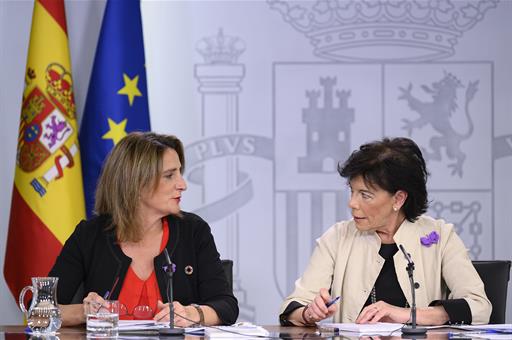Council of Ministers
Government approves 1st Strategic Vocational Training Plan
Council of Ministers - 2019.11.22
Moncloa Palace, Madrid
The Council of Ministers approved the 1st Strategic Education System Vocational Training Plan 2019-2022, which seeks to modernise the consolidation of this training cycle.
The Acting Minister for Education and Vocational Training and Government Spokesperson, Isabel Celaá, argued that this training improves employability, covers the needs of the labour market, changes the productive model and has a major impact on the economy.
Isabel Celaá explained that Spain has more university graduates than the European Union average, 35% of people have low-level qualifications and only 24% have medium-level qualifications, which will be what is most in demand over the coming years.
The acting minister announced that Europe estimates that by the year 2025, only 14% of jobs will require low-level qualifications, while 49% will require medium-level qualifications, and hence the level of knowledge of our citizens needs to be raised.
Spain is also the country with the lowest proportion of students (12%) enrolled on Vocational Training (VT) courses. The European average stands at 29% and the Organization for Economic Cooperation and Development (OECD) average stands at 25%. This is why boosting Vocational Training is a priority for the Spanish Government.
Key features of Strategic Plan
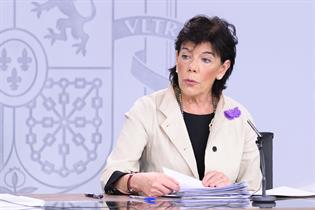 Pool Moncloa/Borja Puig de la BellacasaThe Plan agreed on Friday was presented to the social stakeholders (CEOE, CEPYME, CCOO and UGT) in September 2018 and seeks to ensure that all economic and productive sectors are involved in it.
Pool Moncloa/Borja Puig de la BellacasaThe Plan agreed on Friday was presented to the social stakeholders (CEOE, CEPYME, CCOO and UGT) in September 2018 and seeks to ensure that all economic and productive sectors are involved in it.
Isabel Celaá highlighted that "VT doesn't exist without companies", and hence the government is working with 300 companies to redesign the Qualifications Observatory. In this regard, the government's project involves designing 80 new qualifications and specialised courses closely tied in to digitalisation, and updating the content of the 172 existing qualifications in collaboration with companies and regional governments during this legislature.
One of the key features of the Plan is to make the organisation of qualifications more flexible so that they can be taught online. Furthermore, they will be of a modular nature so that access to teaching can be guaranteed regardless of where the student lives. Another of the goals is to create 200,000 new Vocational Training places over the next four years and extend Mentor Classrooms to reach 3,000 small- and medium-sized municipalities.
The acting minister pointed out that almost half of all active workers have acquired professional experience but do not have a qualification that substantiates this, and hence the Plan provides a procedure to substantiate basic skills for 20,000 adults a year.
Isabel Celaá also underlined that teacher training must be ongoing, and hence joint innovation projects are being carried out with companies, as well as teacher exchange programmes between education centres.
In addition, as regards Vocational Training, the government has approved the allocation of 61 million euros to different education programmes to promote territorial cooperation with regional governments, mainly aimed at teaching VT.
It has also set up, as a national reference centre, the Centro Labora Formació [Labour Training Centre] of Castellon, in the professional field of the manufacture of ceramics.
Just energy transition
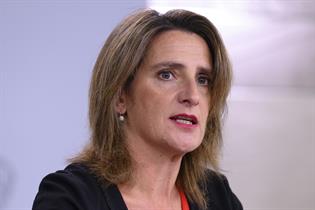 Pool Moncloa/Borja Puig de la BellacasaThe government approved a Royal Decree-Law to adopt urgent measures to boost renewable energies and industrial reactivation in those areas affected by the upcoming closure of thermal power stations.
Pool Moncloa/Borja Puig de la BellacasaThe government approved a Royal Decree-Law to adopt urgent measures to boost renewable energies and industrial reactivation in those areas affected by the upcoming closure of thermal power stations.
The Acting Minister for Ecological Transition, Teresa Ribera, claimed that this new regulation seeks to recover the confidence of investors in renewable energies affected by the reform of the sector in 2013. At that time, she explained, the change in the basis for profitability and remuneration on which investors had made their initial calculations "hugely reduced the forecasts for recovering the initial investment and led to tremendous conflict".
The number of plants affected by that change was 64,000, according to the figures provided by the acting minister, who also referred to the large volume of litigation and arbitration processes that the investors affected thereby - mostly international - lodged and which have led to, or may lead to, recognition of compensation and indemnification by the State.
The Royal Decree-Law allows investors with facilities that date back to before 2013 to maintain the current profitability of their facilities at 7.39% until the year 2031, provided that they waive any entitlement to receive the compensation approved in their favour or desist from arbitration or judicial proceedings currently under way.
Furthermore, the new regulatory text updates, on a general basis, the value of reasonable profitability that will be applied to renewable energy, cogeneration and waste management facilities in the period 2020-2025, which will amount to 7.09%, compared with the current average of 7.39%.
Alleviate impact of closure of thermal power stations
The text also establishes measures designed to alleviate the impact of the closure in 2020 of eight of the 14 coal-fired power stations in Spain. "The aim is for those areas affected not to shut down but to transform their industrial and economic activity", said the acting minister.
Accordingly, continued Teresa Ribera, future renewable energy projects that allocate their investment "to generating quality jobs in the areas affected", will have priority to obtain concessions for the purchase of electricity to the general grid and the use of water that is freed up when the thermal power stations cease their activity.
101 million euros to hire researchers and doctors
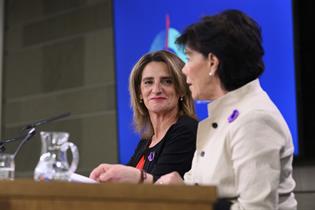 Pool Moncloa/Borja Puig de la BellacasaThe government authorised the State Research Agency to call a round of proposals for "Ramón y Cajal" and "Juan de la Cierva" subsidies to hire doctors and university researchers for R&D centres and Public Research Bodies (Spanish acronym: OPIs), and "Torres Quevedo" subsidies to incorporate doctors in companies.
Pool Moncloa/Borja Puig de la BellacasaThe government authorised the State Research Agency to call a round of proposals for "Ramón y Cajal" and "Juan de la Cierva" subsidies to hire doctors and university researchers for R&D centres and Public Research Bodies (Spanish acronym: OPIs), and "Torres Quevedo" subsidies to incorporate doctors in companies.
Isabel Celaá highlighted the importance of these programmes, framed within the State programme to promote talent and employability, because they lead to the development "of science, research and experimentation".
The "Ramón y Cajal" programme has an economic provision of 61.7 million euros to hire 200 Spanish and foreign researchers with an outstanding track-record, while the "Juan de la Cierva" subsidies will allocate 32 million euros to hiring 450 young doctors.
Another 200 doctors may be hired by technology companies and centres over the next three years thanks to the "Torres Quevedo" contracts, with a budget of 15 million euros. Another 4 million euros will be allocated to 60 training contracts for researchers in companies.
Finally, explained the minister, subsidies will be granted so that university graduates and those with higher technical Vocational Training studies can work as technical support staff for research.
Eradication of violence against women
Isabel Celaá reported that the government has approved an institutional declaration which clearly states that violence against women is an act of violence based on being a member of the female sex.
On the occasion of the International Day for the Elimination of Violence Against Women on 25 November, the government ratifies its decisive commitment to continue devoting all its efforts to combating violence against women in all its forms, its solidarity with the victims and its outright condemnation of violent attitudes and acts towards women on grounds of their sex or gender, guaranteeing the human rights and fundamental freedoms of all women.
Children's rights
The acting minister recalled that Universal Child Rights Day and the 30th anniversary of the UN Convention on the Rights of the Child were held this week. On this occasion, the government approved an institutional declaration reaffirming its commitment to ensure that all children can prosper, learn, make their voices heard and achieve their full potential.
Other agreements
- Approval of financing necessary - 1,945,195 euros - to increase the salaries of healthcare workers by 2.25% in the public sector by 2020.
- 15 million euros allocated to the Regional Government of the Canary Islands to alleviate the effects of the insolvency of the business group Thomas Cook in the tourism sector in the island region.
- Santos Juliá Díaz posthumously awarded the Medal of Merit for Research and University Education, in the gold category.
Current affairs
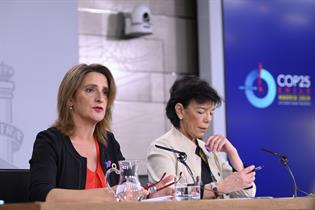 Pool Moncloa/Borja Puig de la BellacasaThe Acting Government Spokesperson reiterated that Spain "enthusiastically takes on" the organisation of the Climate Summit, which will be held in Madrid from 2 to 13 December. Spain, she said, "is on the path to stopping global warming" and is committed to "a new, cleaner, carbon-neutral world".
Pool Moncloa/Borja Puig de la BellacasaThe Acting Government Spokesperson reiterated that Spain "enthusiastically takes on" the organisation of the Climate Summit, which will be held in Madrid from 2 to 13 December. Spain, she said, "is on the path to stopping global warming" and is committed to "a new, cleaner, carbon-neutral world".
Furthermore, Isabel Celaá recalled that the European Commission acknowledges that the performance of the Spanish economy in the first quarter of the year has been more positive than expected. This has been possible, she said, thanks to the "strict management" of affairs by both the Ministry of Economy and Business, and of the Treasury. "We are capable of enhancing social policies whilst also reducing the deficit", she claimed.
Non official translation





